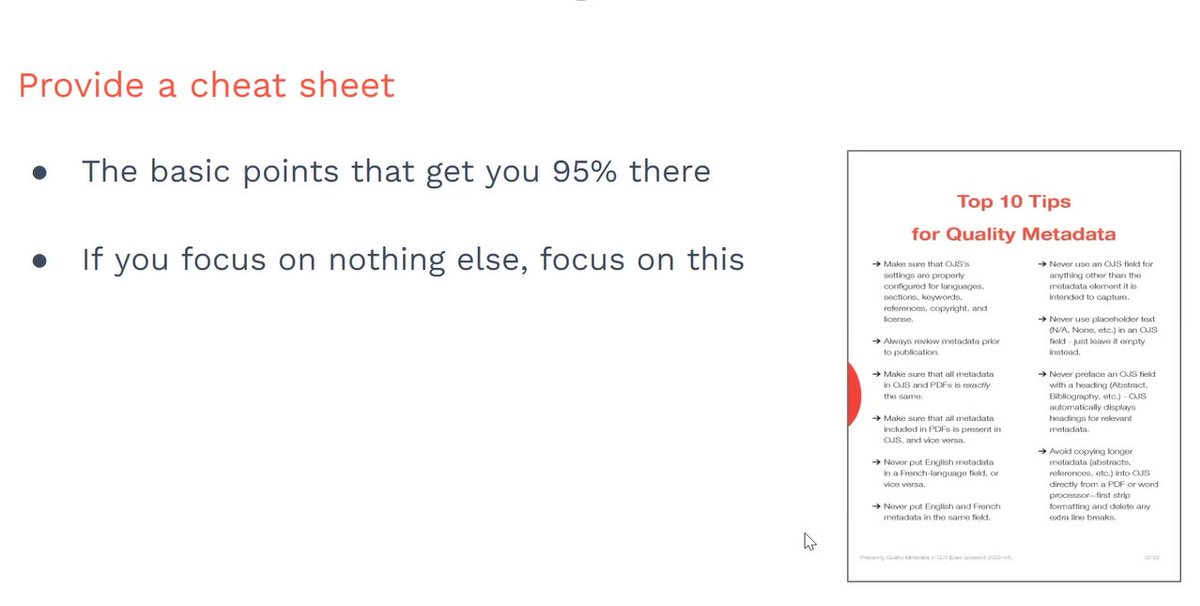Ready for: "Perspectives on #Metadata Quality and Completeness" with @mragucci Jessica Clark & @AnaHeredia2017
sched.co/1D7qH #NisoPlus2023
sched.co/1D7qH #NisoPlus2023
The Publisher perspective on #MetadataImpact - @mragucci - #Metadata is like #TheForce in #StarWars - it is often invisible but powers so much in research and information exchange #NISOPlus2023 



@mragucci Robust standardised #metadata is powerful for all stakeholders in information & knowledge exchange - but practices & standards vary greatly across content types. Ultimately, publishers & content providers have a responsibility to think downstream about the end user #NISOPlus2023 

The complexity of dataflows and #metadata cannot be understated - This diagram provides a library-user focussed view on #discovery via metadata #NISOPlus2023 

There are many pathways to #discovery via #metadata to support students & researchers with finding the resources they need, via library discovery layers, aggregator platforms, document delivery and institutional repositories #NISOPlus2023 

Publishers & content providers need to be aware of different #metadata standards & schema in use by other stakeholders in the information supply-chain - libraries speak #MARC whereas publishers tend to speak #ONIX but there are also system providers using #KBART etc #NISOPlus2023 

Powering #contentdiscovery via #metadata and #GoogleSearch - a lot of searches start with #GoogleScholar so publishers need to work with Google's best practices for tagging & #OpenURLs in order to support search, discovery & access #NISOPlus2023 

- Providers need to heed content optimization & operability standards
- Quality metadata is the key to enabling discovery access & usage (& V4M)
- Enforcing standards requires transparency
- Publishers should monitor metadata trends
- & continue investing in metadata
#NISOPlus23
- Quality metadata is the key to enabling discovery access & usage (& V4M)
- Enforcing standards requires transparency
- Publishers should monitor metadata trends
- & continue investing in metadata
#NISOPlus23

On a personal note, I love the analogy between #metadata and #TheForce as invisible but powerful entities that connect the world!
(And I'm actually wearing a Star Wars tshirt today! 😆)
#IAmOneWithTheForce
#IAmOneWithTheMetadata
#NISOPlus23
(And I'm actually wearing a Star Wars tshirt today! 😆)
#IAmOneWithTheForce
#IAmOneWithTheMetadata
#NISOPlus23
Jessica Clark of Coalition Publica speaks about publishers wanting to host a journal on Open Journal Systems (OJS), and how they often need a #Metadata101 to understand why #MetadataMatters and how to construct it to ensure #discoverability #NISOPlus23 

Coalition Publica can provide a cheat sheet of clear tips and guidance for small and/or scholar-led & multilingual journal publishers to create the best quality metadata for their journal - don't abuse the metadata! don't use 'placeholder' text! #NISOPlus23 

As a content hosting platform collaboration with publishers is key - you need them to buy-in & want to focus on incremental improvements rather than overload them by expecting them to get it right first time #NISOPlus23 #Metadata 

#MetadataNeverSleeps it needs renewal, upgrade and incremental change. #NISOPlus23
@AnaHeredia2017 speaks from the researcher perspective - Researchers have to do a lot to succeed at their institution / in their field, they do not necessarily have capacity to do more... and that includes learning about how to optimise their #metadata #NISOPlus23 

Who is actually responsible for #metadata & why?
- Policymakers & funders?
- Research organisations & institutions?
- Publishers & content providers?
- Researchers creating research outputs?
It's all of them!
#NISOPlus23
- Policymakers & funders?
- Research organisations & institutions?
- Publishers & content providers?
- Researchers creating research outputs?
It's all of them!
#NISOPlus23

#Metadata quality & completeness affects all these stakeholders as it affects:
- Trust & transparency in research
- Reproducibility
- Open Science
- Reuse of data & research results
- Credit, acknowledgement & recognition
- Visibility for researchers & institutions
#NISOPlus23
- Trust & transparency in research
- Reproducibility
- Open Science
- Reuse of data & research results
- Credit, acknowledgement & recognition
- Visibility for researchers & institutions
#NISOPlus23

Maria Johnsson of Lund University continues the conversation re. the researcher perspective on #metadata & #discovery - and how University Libraries can help researchers to understand the values & benefits of quality metadata for their outputs #NISOPlus23 

Convincing researchers about the value of #metadata for their publications & data is a key role for university libraries.
Researchers must provide metadata for their outputs in institutional repositories - education is required so they understand the what how & why #NISOPlus23
Researchers must provide metadata for their outputs in institutional repositories - education is required so they understand the what how & why #NISOPlus23

This education of researchers is a key part of supporting #OpenScience (& #OpenResearch) in which #FAIRprinciples are key - & #metadata is crucial for the F in FAIR - making research #findable to everyone here, there, & everywhere #NISOPlus23 

In the live Q&A and interesting discussion about #responsibility when it comes to ensuring #metadataquality for research outputs (in institutional repositories) - researchers are not metadata experts; you can lead them to water but you can't make them drink! #NISOPlus23
Let the #metadata experts do what they do best - researchers should comply with institutional policies to provide the information required for bibliographic description, but the structuring & standardisation of that data into #metadata should be properly resourced #NISOPlus23
So basically, if we want to ensure the discoverability and usage of research & research data, universities & research organisations need to invest in more metadata experts 🤑 - value your cataloguers & system support people; they make discovery happen!
#NISOPlus23
#NISOPlus23
• • •
Missing some Tweet in this thread? You can try to
force a refresh














